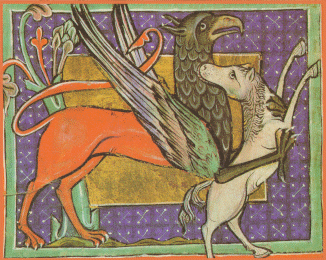
People in the Middle Ages were fascinated by animals and their ways. They thought that the habits of animals could show them truths about God (for example, the tricks of the fox could warn them about the tricks of the Devil, or the phoenix could teach about Jesus rising again after death, and so on). Books were made with pictures and descriptions of amazing animals from far off lands as well as more familiar ones. The pictures you are going to see below come from some of these. The name of this type of book is a Bestiary.

People in the Middle Ages believed that lion cubs were born dead and had
to be brought to life by the breath of the father lion.

Panthers were thought to be many-coloured and to make other animals follow
them because of their sweet smelling breath.

A unicorn was believed to be very fast and so fierce it would fight even
an elephant. The only way to catch one was by using a youing girl, for the unicorn
would at once come to her and put its head in her lap.

In the Middle Ages it was said that elephants were so strong that the Persians
and Indians built towers on them and fought battles.

The gryphon had the body of a lion but the head and wings of an eagle.
It was famous for its hatred of horses and people, which it would often
kill and carry off to its nest.

The phoenix was the most famous bird of all. It was believed to have its
home in Arabia and to live for 500 years. There was only ever one phoenix in
the world at a time. At the end of its long life, this beautiful bird would
build a great fire out of wood and spices, where it would burn to death - only
to be born once more from the ashes.

The manticore was a blood-red creature with a lion's body and man's head
living in India. It hissed like a snake, had a sting in its tail like a scorpian
and loved to eat human flesh.

Under the sea Medieval people imagined many kinds and shapes of fish, grazing
on sea-plants just as animals graze on the land.